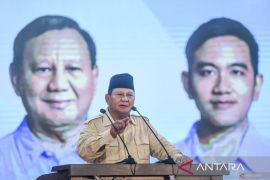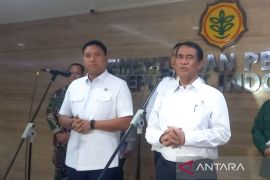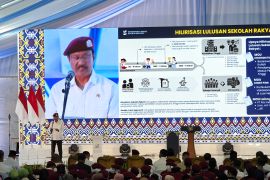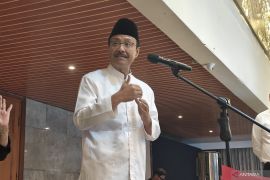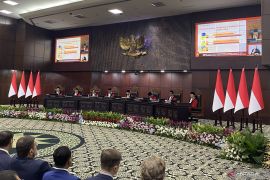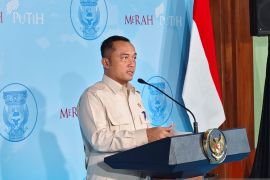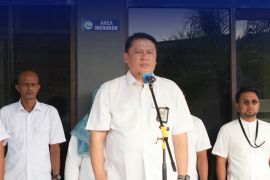"The deficit is huge as state revenues are tight. However, we do not want to reduce expenditures since we have to maintain the momentum and accelerate economic growth," Sri Mulyani stated.Jakarta (ANTARA News) - The budget deficit for 2017, set by the government and announced by President Joko Widodo (Jokowi) before the parliament on Tuesday, is relatively high, reaching 2.41 percent of the gross domestic product (GDP).
The budget deficit is set at a high rate amounting to Rp332.8 trillion as state revenues are tight, while the pace of development and economic growth should continue to be maintained and boosted.
While delivering the Draft 2017 State Budget and its Financial Notes before the plenary session of the House of Representatives in Jakarta on Tuesday, President Jokowi unveiled the governments budget plan for 2017, with a total expenditure of Rp2,070.5 trillion, revenue of Rp1,737.7 trillion, and deficit of Rp332.8 trillion.
According to Finance Minister Sri Mulyani Indrawati, the government has set a relatively high budget deficit as it wants to maintain the momentum of economic growth.
"The deficit is huge as state revenues are tight. However, we do not want to reduce expenditures since we have to maintain the momentum and accelerate economic growth," Sri Mulyani stated at a press conference on the Draft 2017 State Budget on the occasion of the 71st anniversary of Indonesian Independence.
The minister remarked that the budget deficit of Rp332.8 trillion, or 2.41 percent of the GDP, was set based on the state revenue projection of Rp1,737.6 trillion and state expenditures of Rp2,070.5 trillion.
Mulyani said that in a bid to cover the deficit, the government will still depend on external debts, among others, through the issuance of state debentures worth Rp389 trillion. In this case, the government will continue to maintain its debt to GDP ratio within a safe limit.
The minister also made assurance that the government will use the debts to finance productive sectors, maintain the macroeconomic balance, and optimize financing for creative and innovative activities in its efforts to boost development.
Some Rp49.1 trillion will be used to finance investment, Rp6.4 trillion for loan extension, and Rp0.9 trillion for assurance obligation.
"The 2017 budget financing will be directed to increase financing access for micro-, small-, and medium-scale enterprises, boost exports, open financing access for the public, support access to education, and provide housing facilities to the people of the low-income group," the minister pointed out.
In general, the Rp332.8 trillion budget deficit for 2017, which is 2.41 percent of the GDP, increased by Rp36.1 trillion from that set for 2016, which stood at Rp296.7 trillion, or 2.35 percent of the GDP.
Regarding the realization of the deficit set for 2016, the Finance Ministry has recorded that until August 5 this year, the budget deficit had reached Rp262.5 trillion or about 2.08 percent of the gross domestic product (GDP), owing to low state revenues and high government expenditure.
The chief of the Information Service and Communications Bureau of the Ministry of Finance, NE Fatimah, said in Jakarta on Wednesday that the budget deficit has reached 88.5 percent of the Rp296.7 trillion target, or 2.35 percent of the GDP.
The budget deficit was a result of the fact that tax revenues until the first week of August 2016 had reached Rp618.3 trillion, or 40.2 percent of the target, slightly lower than Rp626.7 trillion in 2015 or 42 percent of the target.
The taxation receipts consisted of tax income valued at Rp542.1 trillion or 40 percent of the target and customs and excise receipts worth Rp76.2 trillion, or 41.4 percent of the target.
In the meantime, the absorption of the central government expenditures until August 5, 2016 reached Rp585.7 trillion, higher than Rp561.4 trillion in the same period of 2015.
The central government expenditures included expenditures for ministries/state institutions worth Rp323.7 trillion and non-ministry expenditures accounting for Rp262 trillion.
The high rate of the central government's expenditure was thanks to the expedited auction of pojects as can be seen from the significantly high capital and goods spending rates when compared to the previous year.
Besides, the spending on regional transfer and village funds also increased from Rp395.6 trillion in 2015 to Rp452 trillion in 2016. This is a result of the increased expenditure on infrastructure development.
Debt financing level reached Rp299.2 trillion, and consisted of Rp326.6 trillion worth of government bonds (SBN), loan withdrawal at home worth Rp0.4 trillion and loan withdrawal overseas worth negative Rp23.7 trillion.
Based on the realization of the budget deficit and financing, the budget performance up to August 5, 2016 showed Rp36.7 trillion as unused budget amount.
In its RAPBN 2017, the government has set macro assumption targets that include an economic growth at 5.3 percent, crude price at US$45 per barrel, state treasury bill interest rate at 5.3 percent, rupiah currency rate at Rp13.3 thousand per US dollar, and inflation at four percent.
On the economic growth, Coordinating Minister for Economic Affairs Darmin Nasution said he is optimistic that the economic growth target of 5.3 percent in 2017 could be achieved by optimizing the performance of the investment sector.
"If you ask whether the 5.3 percent target is achievable, I think it is not something that is difficult to achieve," Nasution stated in Jakarta on Wednesday.
Nasution believed the government can solve a variety of domestic and global challenges because it has taken certain steps in anticipation, such as the issuance of economic policy packages which will start yielding visible results in 2017.
"We believe that all this could enhance the economic growth, but not too significantly," he underlined.
Overall, the government expects the economic growth in 2017 to have a qualitative improvement, thanks to better human resources, improved productivity and equitable economic development.(*)
Reporter: Andi Abdussalam
Editor: Heru Purwanto
Copyright © ANTARA 2016
